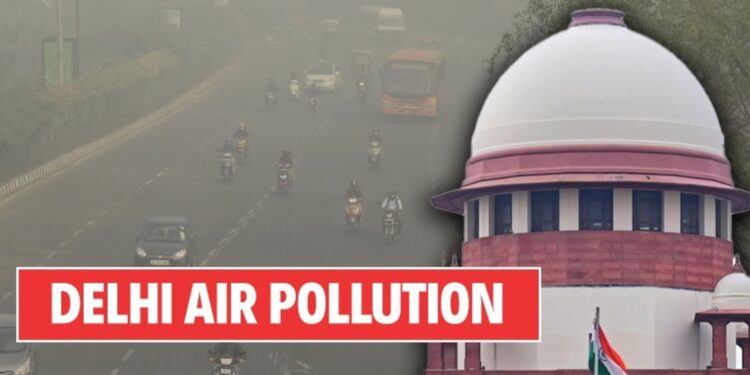The Supreme Court’s concerns over Delhi’s pollution crisis deepened as the national capital reportedly recorded the world’s worst air quality index (AQI). During Thursday’s hearing on the matter, the Court was informed that urgent action was needed to prevent Delhi from becoming the most polluted city in the world.
The Bench, consisting of Justices Abhay S. Oka and Augustine George Masih, heard from Senior Advocate Aparajita Singh, who appeared as amicus curiae. She highlighted the severity of the situation, saying, “We are in severe mode today. The Delhi government has not yet taken any preemptive measures. Nothing has been done. We should not become the most polluted city in the world.” The Court responded by scheduling a follow-up hearing for Monday.
The Court had previously raised alarm over the government’s inability to curb the bursting of firecrackers during Diwali, noting that pollution-free living is a fundamental right under Article 21 of the Constitution of India. The Court emphasized that no religion encourages activities that lead to pollution or harm public health. “Prima facie, we are of the view that no religion promotes any activity which compromises people’s health,” the Bench said.
The ongoing case scrutinizes the actions taken by authorities in neighboring states, including Punjab, Haryana, and Uttar Pradesh, to combat stubble burning, a significant contributor to the smog choking Delhi each year. In a recent hearing, the Court questioned Delhi authorities and the police on why the firecracker ban during Diwali was flouted and even suggested that the Delhi government consider a permanent ban on firecrackers to help tackle the pollution crisis.
In September, the Court criticized the Commission for Air Quality Management (CAQM), established to improve Delhi’s air quality. The Court noted that while the Commission had taken some action, it had yet to live up to its expectations and urged it to be more proactive. “Though we cannot say that the Commission has not taken any action, the learned amicus curiae is right in submitting that the Commission has not performed as expected,” said the Bench. It emphasized that the Commission’s actions must produce tangible results in reducing pollution.
Stubble burning, a practice in which farmers burn leftover straw after harvesting wheat and paddy, remains one of the most significant contributors to Delhi’s deteriorating air quality. While the practice is cost-effective for farmers looking to clear fields for the next crop, it produces a sharp spike in pollution levels and severely impacts air quality, causing a public health crisis.
The Court reiterated its demand that stubble burning must cease and called for a collective effort from all stakeholders to tackle the ongoing pollution issue. The Court’s stance highlights the urgent need for effective measures to combat the causes of Delhi’s pollution and protect citizens’ right to a healthy environment.

















